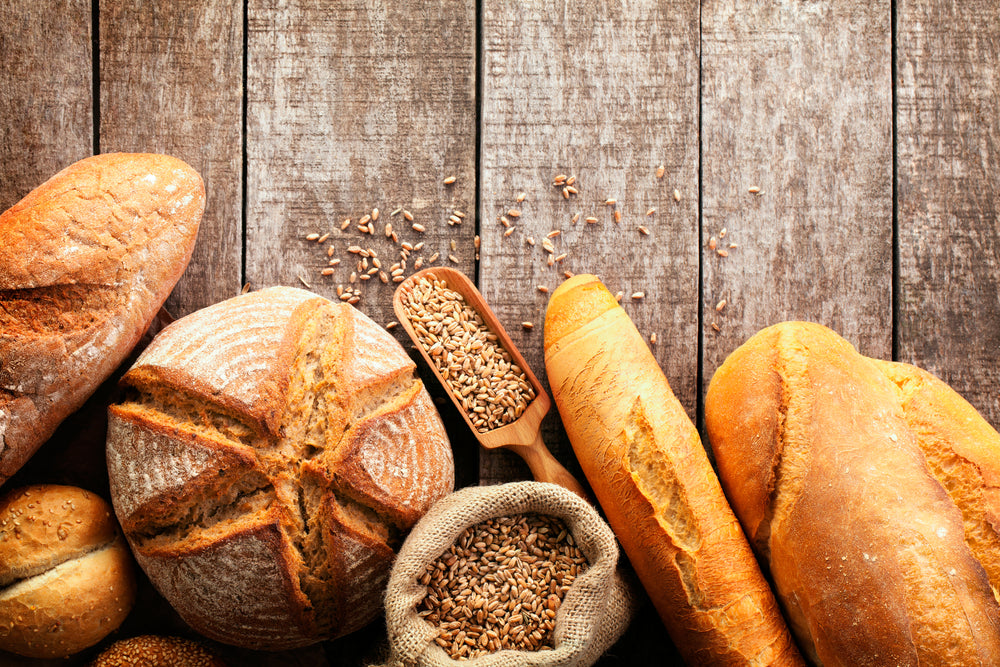Does Bread Cause Bloating and Gas?

Share
Bread has been a staple food for centuries, loved for its versatility of use and it’s delicious taste. However, in recent years, there has been a growing concern about its impact on digestive health. Many people wonder: does bread cause bloating and gas? In this article, we are going to explore in detail how bread affects the digestive system, including the impact of different types of bread.
Does Bread Cause Bloating?

Bloating, characterized by a feeling of fullness and tightness in the abdomen, is a common complaint after consuming certain foods. Bread is often cited as a culprit. But does it really cause bloating?
Bread, typically made from flour, water, yeast, and sometimes other ingredients, undergoes a process of fermentation and baking to transform it into the fluffy loaves we all love. However, this seemingly simple combination of ingredients can elicit complex reactions within our bodies, particularly concerning digestion. It is important to note, however, that different types of bread may impact digestion in different ways.
White Bread
White bread, made from refined flour, is often blamed for causing bloating due to its high glycemic index and low fiber content. The rapid spike in blood sugar levels after consuming white bread can lead to bloating in some individuals. Additionally, the lack of fiber may contribute to slower digestion, exacerbating feelings of discomfort. (1)
Sourdough Bread
Can sourdough bread cause gas? It may, but it depends on other digestive factors, as sourdough bread is typically gut-friendly. Sourdough undergoes a fermentation process that breaks down gluten and phytic acid, potentially making it easier to digest for some people. (2) While it's less likely to cause bloating compared to white bread, individuals with gluten sensitivity or intolerance may still experience discomfort.
Whole Wheat Bread
Whole wheat bread contains more fiber and nutrients compared to its refined counterpart, which can aid digestion and promote a feeling of ffullness. However, the presence of gluten may still trigger bloating in sensitive individuals.
Wheat Bread
Wheat bread, which may or may not be whole grain, can vary in its impact on bloating depending on factors such as fiber content and individual tolerance to gluten.
So, while bread, especially white bread, may contribute to bloating in some people due to its high glycemic index and low fiber content, other types such as sourdough and whole wheat bread may be better tolerated by certain individuals. That being said, someone that has a gluten sensitivity or intolerance may still experience symptoms of varying discomfort after eating bread, depending on the severity of their intolerance.
Does Bread Cause Gas?

Gas, often accompanied by bloating, is another digestive issue associated with bread consumption. But does bread really cause gas?
White Bread
Just as white bread may cause bloating, it is also the most likely type of bread to cause gas. The rapid digestion of refined carbohydrates in white bread can lead to the production of gas in the digestive tract, contributing to bloating and discomfort.
Sourdough Bread
Sourdough bread, thanks to its fermentation process, may be easier to digest for some individuals, potentially reducing the likelihood of gas production compared to white bread.
Whole Wheat Bread
Whole wheat bread contains more fiber, which can aid digestion and regulate bowel movements, potentially reducing gas production in some individuals. (3) However, those with sensitivities to gluten may still experience gas and bloating.
Wheat Bread
Similar to whole wheat bread, wheat bread's impact on gas production varies depending on factors such as fiber content and individual tolerance to gluten. While bread, particularly white bread, may contribute to gas production in some individuals due to its composition and rapid digestion, other types such as sourdough and whole wheat bread may have a lesser effect.
What's The Deal With Gluten?

Gluten is a protein composite found in wheat, barley, and rye. (4) It serves as a binding agent that gives dough its elasticity and helps it rise during baking. While many individuals can consume gluten without issue, some people experience adverse reactions to this protein, leading to a condition known as gluten sensitivity.
Gluten sensitivity, also referred to as non-celiac gluten sensitivity (NCGS), is characterized by symptoms such as bloating, abdominal discomfort, diarrhea, fatigue, and headaches after consuming gluten-containing foods. Unlike celiac disease, an autoimmune disorder triggered by gluten ingestion, gluten sensitivity does not involve the immune system attacking the intestines. Instead, it manifests as a range of gastrointestinal and systemic symptoms, often overlapping with those of other digestive disorders. For those with gluten sensitivity, avoiding gluten-containing foods, including bread, is essential to managing symptoms and promoting digestive well-being. (5)
Support Digestion with Digestive Enzymes!
One of the most effective ways of supporting digestion is by supplementing with digestive enzymes.† Enzymes are special types of proteins required to break down foods, so they are small enough for the body to absorb the nutrients and use them for fuel. With better nutrient absorption, your body can more effectively use the nutrients from food for energy, tissue growth and repair, allowing you the health and nutrition needed to perform at your best.†
Summary
The impact of bread on bloating and gas varies depending on factors such as type (white, sourdough, whole wheat, wheat), individual tolerance, and overall dietary habits. While some people may experience bloating and gas after consuming bread, others may tolerate it well. For individuals experiencing digestive discomfort, experimenting with different types of bread and monitoring reactions can help identify triggers and make informed dietary choices. Additionally, incorporating a variety of fiber-rich foods and staying hydrated can support digestive health and reduce bloating and gas.
So, while bread may cause bloating and gas in some individuals, it's not a universal issue. Understanding your body's response to different types of bread and making adjustments accordingly can help alleviate discomfort and promote digestive well-being.
References
1 https://pubmed.ncbi.nlm.nih.gov/2050093/
2 https://www.ncbi.nlm.nih.gov/pmc/articles/PMC9602196/
3 https://www.ncbi.nlm.nih.gov/pmc/articles/PMC7599874/